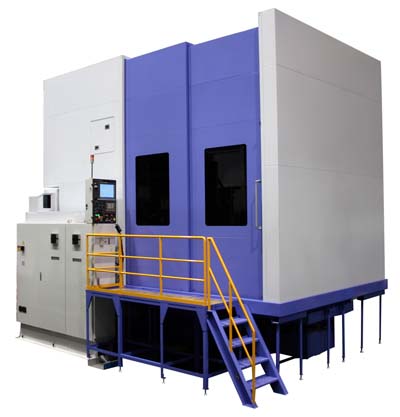GEA1200
GEA1200
Mitsubishi Heavy Industries Ltd. (MHI) has developed a new GEA Series of gear hobbing machines capable of processing large workpieces.

Mitsubishi Heavy Industries Ltd. (MHI) has developed a new GEA Series of gear hobbing machines capable of processing large workpieces. Equipped with a rigid hob head and rotating table, the GEA1200, the first model in the series, can accommodate high-efficiency, high-precision machining of gears up to 1,200mm in diameter. Going forward, MHI will explore a broad range of demands for heavy-duty machining applications, including production of step-up gears and gear reducers used in wind turbines and construction machinery. The GEA1200 hobbing machine comes equipped with a 30 kW main motor — a 60 kW option is also available — and a 1,200mm-dia. hydrostatic bearing table capable of bearing superimposed loads up to 15 tons. The large-size hob, with maximum diameter of 350mm (optional is 500mm), rotates at a speed of 25 to 250 rpm and cuts gears up to 20 modules (optional is 30 modules). The GEA1200 can reduce machining time by about 30 percent compared to existing hobbing machines of this size, according to the company. The GEA Series is part of MHI's Mitsubishi E Series of gear machines designed for energy saving and high operability to meet global standards with regular specifications (without optional equipment). Machines in the E Series, which includes hobbing, shaping and gear grinding machines, feature the same concept to facilitate the creation of production lines combining these machines. Many energy-saving features are standard, noise reduction and environmental friendliness have been maximized, and operability and maintenance ease have been enhanced. In developing the GEA Series, MHI's Machine Tool Div. collaborated with the company's Technical Headquarters in conducting various rigidity analyses relating to the basic structure of large-size gear cutting machines and measures for thermal displacement. Collaboration enabled the achievement of enhanced machine rigidity, a shorter development period and improved machining efficiency. Recently demand for large-size gears has been increasing for applications involving step-up gears and swivel parts in wind turbines, gear reducers and traversing gears used in construction machinery and deck cranes, and various gears used in servo presses, marine machinery and iron and steel manufacturing machinery. At the same time, high-efficiency and high-precision gear cutting machines are being sought globally. Also, for processing gears with diameters smaller than 1,000mm, demand is increasing for machines capable of heavy-duty machining. The GEA Series was developed to respond to all of these needs. Going forward MHI plans to develop and introduce models to accommodate even larger workpieces with diameters of 1,600 and 2,000mm. Spurred by the market launch of the GEA1200, MHI now looks to introduce gear shaping and gear grinding machines that can accommodate up to 2,000mm-dia. workpieces. At the same time, plans call for the company to establish a new business model encompassing after-sale services, maintenance and tool supply, primarily for large-size gear machines.





